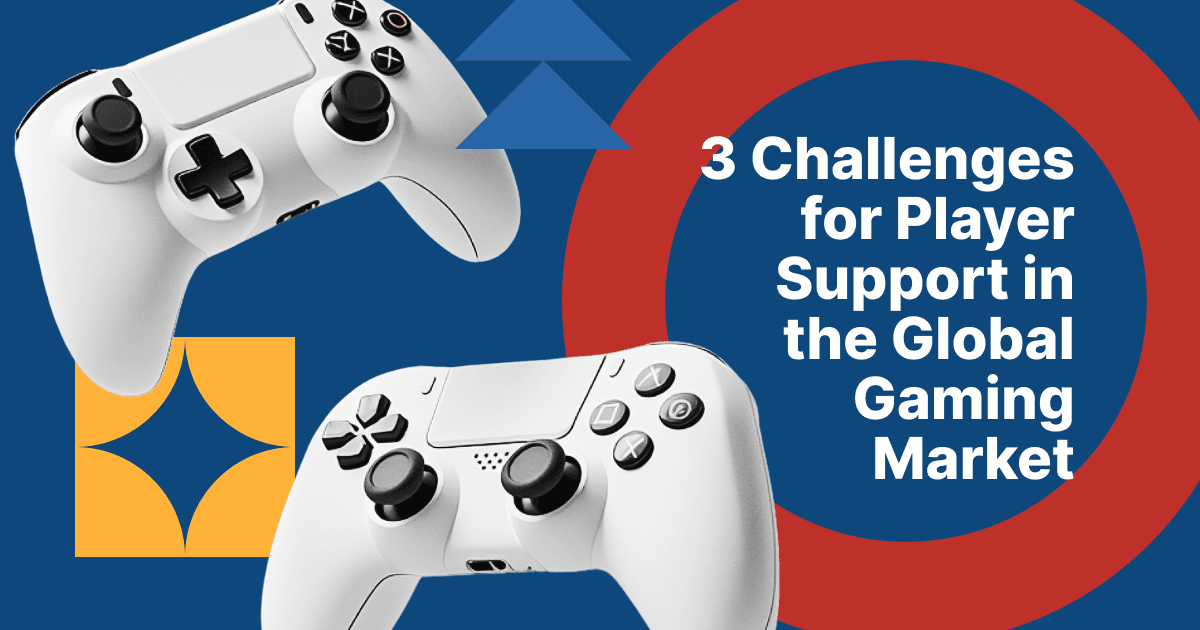Gaming was once a niche hobby funded by quarters in arcade machines and fringe tech enthusiasts. In 2000, the gaming industry generated about $30 billion in global revenue, with almost a third coming from arcades. Since then, the industry has grown exponentially, with digital distribution, live-service models, and hardware in every home. In 2024, it accrued $455 billion in global revenue.
Today, a single viral moment can catapult a title into the mainstream, while subscription services and online multiplayer ensure that games reach more players in more markets than ever before.
But adding new players means adding new challenges too. Player bases are bigger, more diverse, and spread across multiple time zones. The days of simply staffing a help desk or calling a technician to knock tokens out of a machine have been over for a while now. Now, player support is about managing thousands of multilingual inquiries, enforcing region-specific regulations, and maintaining seamless service across every platform.
Let's break down some of the new challenges in today's gaming industry and what studios need to be prepared for.
Player Counts Can Multiply Overnight
It's not just the big studios driving that. The indie game, Undertale, was developed by just one person and raised $50,000 on Kickstarter from about 2,000 backers. But, after going viral, it went on to sell over 8 million copies and grossed about $106 million in revenue. The game Hollow Knight has a similar story, with three developers raising just $20,000 on Kickstarter, later grossing $248 million in revenue.
From social media to subscription services like PlayStation Plus and Xbox Game Pass, millions of players have access and exposure to games they might not have otherwise purchased. Digital storefronts have also almost eliminated distribution costs, making it easy for players to find your game.
However, when the player base expands, so does everything else. More players mean more questions, more technical issues, and more demand for assistance across multiple platforms and regions.
If your game is a live-service title, the stakes get even higher with concurrent player counts thrown into the mix. Helldivers 2, another indie title, launched to over 200,000 concurrent players—far exceeding their projections. This led to massive server downtime and unbearably long queues with no estimated wait times for the players in line.
Bugs ran rampant as waves of players stress-tested the game far beyond what the developers had anticipated. The studio's CEO commented on the numerous emergency meetings, late-night calls, and weekend crunch time associated with the launch.
It's a cautionary tale on the importance of preparing scalable player support before a launch. If your title becomes a smash hit, you don't want to be left overworked and stressed when you should be celebrating a win.
Modern Games Have International Audiences
The internet doesn't have borders. With digital storefronts, streaming platforms, and social media expanding their reach, titles can take off in entirely new markets overnight. Games that go global will bring in players who speak different languages, use different payment systems, and expect localized support.
Even if global expansion wasn't part of your plan, it might happen whether you're ready for it or not. Take Among Us, for example. Released in 2018, it remained relatively obscure until mid-2020, when content creators in South Korea and Brazil began streaming it on Twitch. That led to an overnight explosion with the game exceeding 100 million downloads in September of the same year. The lead developer states that the game is still more popular in Mexico, Brazil, and South Korea than it ever was in the U.S.
With 1.5 billion gamers in Asia alone, the potential for rapid international growth is greater than ever. This surge of unexpected players means unexpected support needs, and multilingual players introduce unique challenges that go beyond scale.
Language barriers mean basic issues can turn into roadblocks—from login problems to payment confusion and content restrictions. If tools like your self-service pages aren't in their language, players are also forced to submit tickets for basic questions, clogging up queues and slowing down resolutions. If the right support isn't in place from the get-go, a golden opportunity turns into a missed one—or worse, a negative reputation in a new market.
Industry Laws Have Gotten Complicated
Scale and diversity are two of the biggest challenges that good player support needs to account for. However, there's a third piece you can't do without either, even if you've got an office full of multilingual agents on standby: regional compliance.
Contrary to what some players may think, gaming is a highly regulated industry with regional laws that dictate everything from player interactions to account restrictions and data privacy. Here are just a few key examples where countries have set unique and strong regulations around gaming:
Age and Playtime Restrictions Vary by Country – In China, players under 18 are restricted to just a few hours of gameplay per week, and real-name verification is required to enforce this rule. Most importantly for studios, the burden is placed on the company to enforce these rules, making it illegal to provide online gaming service to minors outside of daylight hours or past their allotted amount. Poorly translated support interactions that fail to inform players correctly—or worse, allow workarounds due to miscommunication—can lead to government intervention, penalties, or game suspensions in those markets.
Regional Moderation Laws Are Strict – Many countries, especially in Europe and Asia, hold companies responsible for monitoring and removing harmful content. If support teams lack local knowledge and language skills, they might miss critical reports or fail to enforce policies effectively, exposing your game to legal risks.
Privacy and Data Protection Regulations Differ Globally – Various laws such as the GDPR (Europe), CCPA (California), and PIPL (China) impose strict requirements on handling player data. If a support agent can't properly explain a data deletion request due to language barriers, you could face hefty fines or forced compliance actions.
Laws in gaming are constantly evolving, and local authorities expect full compliance, not translation errors or misunderstandings. Localized player support isn't just about keeping players happy—it's about keeping your game accessible and legally compliant in every market you operate in.
Why One-Size-Fits-All Won't Cut It
Modern gaming has distinct challenges and needs. Studios can't afford to wait until after the launch to figure out player support or moderation. It's also not feasible to handle problems as they come up with your existing staff. Not only is it a recipe for burnout, but you're also risking the game's success by waiting for the damage to hit first.
Studios and publishers need specialized teams, dedicated to player support, server QA, and Trust & Safety, that can solve for these challenges before they become problems.
Whether it's ensuring players get help when they need it, squashing bugs before they break the experience, or moderating communities without killing engagement, the right strategy is one that adapts, scales, and understands the culture.
If you're looking to learn more about how you can achieve that, we've got you covered. Check out our other article, where we cover how you can solve these problems as cost-effectively as possible with the right strategies.




